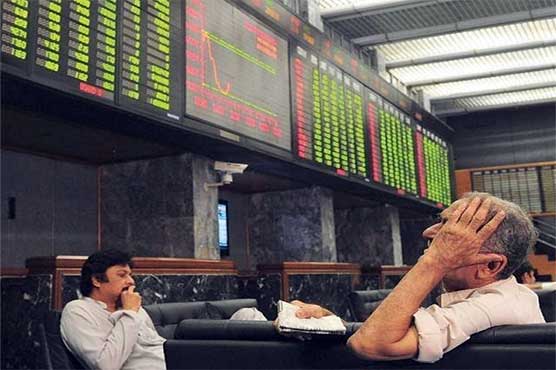PSX sheds 400.49 points to close at 41,898.70 points

A total of 197,137,000 shares were traded compared to the trade 189,002,866 shares
ISLAMABAD (Dunya News) – The Pakistan Stock Exchange (PSX) on Wednesday witnessed bearish trend as KSE 100 index closed at 41,898.70 points as compared to 42,299.19 points on the last working day with the negative change of 400.49 points (0.95%).
A total of 197,137,000 shares were traded compared to the trade 189,002,866 shares during the previous day, whereas the value of shares traded during the day stood at Rs7.4 billion as compared to Rs6.715 billion during last trading day.
Total 353 companies transacted shares in the Stock Market on Wednesday, out of which 106 recorded gain and 236 sustained losses whereas the share price of 11 companies remained unchanged.
The three top traded companies were, WorldCall Telecom with a volume of 22,725,000 shares and price per share of Rs1.16, Hascol petrol with a volume of 17,877,000 and price per share of Rs25.47 and Maple leaf with a volume of 10,855,500 and price per share of Rs24.99.
Indus DyeingXD recorded the maximum increase of Rs26.23 per share, closing at Rs503.23 while Service Ind Ltd XB was runner up with the increase of Rs22.23 per share, closing at Rs902.23.
Siemens Pak.XD recorded maximum decrease of Rs35.97 per share, closing at Rs618.03 whereas prices of Archroma Pak decreased by Rs34.92 per share closing at Rs600.08.
Yesterday, State Bank of Pakistan (SBP) Governor Dr Reza Baqir announced the bank’s first monetary policy announcement of 2020, and stated that the interest rate has kept unchanged as the inflation rate was expected to remain at 11 to 12 percent this year. The central bank has held rates at 13.25pc since July, when it took a pause from a series of hikes at a level some businesses and exporters have said is hampering investment.
He, however, said the improvements in supply were likely to reduce the inflation rate. “Inflation will start declining gradually, but when we’re not sure, we can’t say,” Mr Baqir said. He said an increase of Rs100 billion was being made in working capital scheme.
Inflation rose 12.6pc in the year to December, just below an almost nine-year high of 12.7pc hit a month earlier, as rising costs for items like food put pressure on household budgets and rising oil and power prices lifted costs for businesses.
The bank also announced measures to support exporters, such as increasing credit limits, underscoring the toll historically high rates are having on businesses for whom the prospect of higher borrowing costs could lead to holding off on investment.
Several traders are of the view that Pakistan is unlikely to exit the grey list of the Financial Action Task Force (FATF) next month despite an active support of its close ally China and tactical support of some Western countries.
Traders had opined that the market was still in search of a direction, which could be provided by the State Bank monetary policy and the herald of corporate results reporting season next week.
Traders were of the view that after a major run-up since August last year, the index was consolidating at the current levels before moving forward. “Early trade has been witnessing much of the volatility and the index has been fluctuating from negatives to positives and vice-versa.”
Earlier, investors’ optimism continued as they saw the market back in the green after two earlier dismal years of negative returns.
From Aug 16, 2019 when the benchmark index had hit the pit at 28,765 points, the market has witnessed a spectacular rally that has carried it up by more than 50pc in fewer than five months.
Improvement on the external front together with stability in the Pakistani Rupee was expected to reassure foreign investors.
The current account deficit had contracted by 75pc to $2.15 billion in the six months ending December, according to the bank’s monetary policy statement. Foreign reserves had risen more than 60pc to $11.7 billion in the past six months.
Contrarily, some economists have raised concerns about this so-called ‘hot money’ as high interest rates draw foreign investment into short-term debt which could pose a risk if it is suddenly withdrawn.

